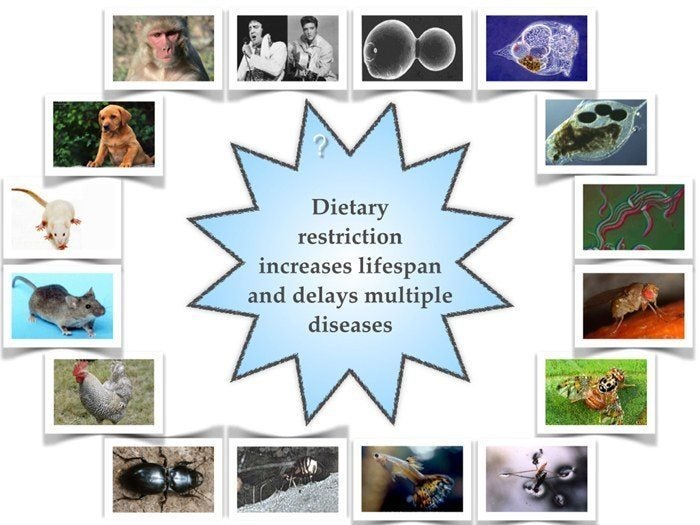Dietary Restriction (DR), a moderate reduction in food intake without malnutrition, is the most successful intervention discovered to date for increasing healthy lifespan in multiple species. DR has been shown to prolong median and maximum lifespan in organisms spanning the evolutionary spectrum, from single-celled yeast to non-human primates. Critically, DR also has profound effects on age-related pathology, delaying the onset and severity of many complex diseases including metabolic disease, neurodegenerative disorders, cardiovascular disease and cancer. However, DR also imposes negative physiological, psychological and social side-effects. One aim of our laboratory is to elucidate the molecular mechanisms governing the positive effects of DR on health, separate from those that are detrimental, with the goal of developing novel small molecules that mimic the effects of DR.
By taking advantage of the evolutionary conservation of DR, we can use easily manipulatable organisms such as the nematode worm C. elegans and the fruit fly Drosophila to determine the genetic pathways responsible for the beneficial effects of DR on pathology, and use this knowledge to develop novel, multi-target therapeutics for human disorders.

Mechanisms of Lifespan Extension by Dietary Restriction in Drosophila melanogaster
William Mair’s early publications during his graduate studies used Drosophila melanogaster to enhance our understanding of how dietary restriction promotes healthy aging. He determined that dietary restriction does not slow the rate of aging but rather removes an acute, transient risk of death that is reversible. Drosophila subjected to DR late in life are subsequently no more likely to die than chronically restricted cohorts. This work shifted our understanding of how DR impacts mortality and has exciting implications for the potential of DR mimics as late onset therapeutics. It has been complemented by subsequent experiments in mammals that reveal rapid and striking effects of short-term dietary restriction on both gene expression and stress resistance. This paper therefore has direct implications on the translational capacity of mechanisms underlying the DR response. Building on this he then demonstrated that decreased mortality under DR is not the result of a simple tradeoff with the costs of reproduction, challenging the Y-allocation evolutionary theory of DR. He also found that the nutrient balance of food, not caloric content, is the key determinant of lifespan extension via DR in Drosophila. These studies formed the basis of subsequent work from Dr. Partridge’s group revealing specific amino acid combinations that induce long life without reduced reproduction, a ‘Darwinian Demon’, with profound consequences for aging research. This work challenged prevailing views that DR increases lifespan purely by caloric reduction and led to studies in mammalian systems on the effects of reducing single amino acids in the diet on aging and disease. In more recent work during his postdoc, Will and colleagues were the first to simultaneously prolong lifespan and maintain stem cell niche using Drosophila as a model.
- Mair W, Goymer P, Pletcher SD, Partridge L. Demography of dietary restriction and death in Drosophila. Science. 2003 Sep 19;301(5640):1731-3. PubMed PMID: 14500985.
- Mair W, Sgrò CM, Johnson AP, Chapman T, Partridge L. Lifespan extension by dietary restriction in female Drosophila melanogaster is not caused by a reduction in vitellogenesis or ovarian activity. Exp Gerontol. 2004 Jul;39(7):1011-9. PubMed PMID: 15236760.
- Mair W, Piper MD, Partridge L. Calories do not explain extension of life span by dietary restriction in Drosophila. PLoS Biol. 2005 Jul;3(7):e223. PubMed PMID: 16000018; PubMed Central PMCID: PMC1140680.
- Mair W, McLeod CJ, Wang L, Jones DL. Dietary restriction enhances germline stem cell maintenance. Aging Cell. 2010 Oct;9(5):916-8. PubMed PMID: 20569233; PubMed Central PMCID: PMC2944899.
Mechanisms of Lifespan Extension by Dietary Restriction in C. elegans
The Mair lab also uses C. elegans as a genetically tractable system to understand genetic pathways mediating lifespan extension by dietary restriction. We have evaluated the requirements of AMPK, Sirtuins and H2S signaling for DR lifespan. We have also evaluated how different paradigms of DR in C. elegans modulate lifespan via alternate signaling pathways. Recently we have collaborated to use a systems biology approach to reverse engineer lifespan extension by DR using unbiased RNA Sequencing approaches.
- Dietary Restriction and AMPK Increase Lifespan via Mitochondrial Network and Peroxisome Remodeling.
Weir HJ, Yao P, Huynh FK, Escoubas CC, Goncalves RL, Burkewitz K, Laboy R, Hirschey MD, Mair WB
Cell Metabolism.2017 Oct 23. pii: S1550-4131(17)30612-5. doi: 10.1016/j.cmet.2017.09.024. [Epub ahead of print] - Splicing Factor 1 Modulates Dietary Restriction and TORC1 Pathway Longevity in C. elegans.
Heintz C, Doktor TK, Lanjuin A, Escoubas CC, Zhang Y, Weir HJ, Dutta S, Silva-García CG, Bruun GH, Morantte I, Hoxhaj G, Manning BD, Andresen BS and Mair WB.
Nature. 2017 Jan 5;541(7635):102-106. doi: 10.1038/nature20789. Advance online Dec 5 2016. - Hou L, Wang D, Chen D, Liu Y, Zhang Y, Cheng H, Xu C, Sun N, McDermott J, Mair WB, Han JD. A Systems Approach to Reverse Engineer Lifespan Extension by Dietary Restriction. Cell Metab. 2016 Mar 8;23(3):529-40. PubMed PMID: 26959186.
- Hine C, Harputlugil E, Zhang Y, Ruckenstuhl C, Lee BC, Brace L, Longchamp A, Treviño-Villarreal JH, Mejia P, Ozaki CK, Wang R, Gladyshev VN, Madeo F, Mair WB, Mitchell JR. Endogenous hydrogen sulfide production is essential for dietary restriction benefits. Cell. 2015 Jan 15;160(1-2):132-44. PubMed PMID: 25542313; PubMed Central PMCID: PMC4297538.
- Hwang AB, Ryu EA, Artan M, Chang HW, Kabir MH, Nam HJ, Lee D, Yang JS, Kim S, Mair WB, Lee C, Lee SS, Lee SJ. Feedback regulation via AMPK and HIF-1 mediates ROS-dependent longevity in Caenorhabditis elegans. Proc Natl Acad Sci U S A. 2014 Oct 21;111(42):E4458-67. PubMed PMID: 25288734; PubMed Central PMCID: PMC4210294.
- Mair W, Panowski SH, Shaw RJ, Dillin A. Optimizing dietary restriction for genetic epistasis analysis and gene discovery in C. elegans. PLoS One. 2009;4(2):e4535. PubMed PMID: 19229346; PubMed Central PMCID: PMC2643252.



